| Voice/Instrument: | Basso |
Biography
Born: 1947 - Kampen, Holland
The Dutch bass, Harry van der Kamp, first studied law and psychology in Amsterdam. Then he studied singing with Elizabeth Cooymans and Max van Egmond at the Amsterdam Sweelinck Conservatory. He also took courses with Alfred Deller, Pierre Bernac and Felix de Nobel. From 1974 he studied with Herman Woltman.
Until 1975 Harry van der Kamp was a member of Cappella Amsterdam, directed by Jan Boeke, and from 1974 until 1994 of the Nederlands Kamerkoor, whose artistic adviser he was from 1982 (or 1980) to 1987 In 1984 he founded his own ensemble, Gesualdo Consort Amsterdam, for the performance of music from the early 1600's and music of the 20th century.. This experimental ensemble has appeared with great success in many European festivals.
Today, Harry van der Kamp is internationally known as one of the most important bass singers in the solo and ensemble repertoire of the 14th–18th centuries. He is a protagonist of the Baroque period (17th and 18th centuris) repertoire for bass solo, enjoys a great reputation as a bass-baritone, and has performed numerous oratorios, cantatas, and dialogues of that period. He is also a dedicated performer of contemporary music. His 30-year career has taken him all over the world, from New York to Peking. He has performed with all the leading Baroque specialists. During his career, he has worked with conductors such as Nikolaus Harnoncourt (J.S. Bach, Mozart, Georg Frideric Handel), Hans Vonk (Igor Stravinsky, Weill), Sergiu Commissiona (Rossini, Verdi), Gustav Leonhardt (J.S. Bach, Monteverdi, Biber, Purcell), Ivan Fischer (Monteverdi, Jan Dismas Zelenka, Heinrich Schütz), Bruno Weil (Haydn, Schubert), Frans Brüggen (J.S. Bach, H. Schütz), William Christie (Monteverdi, G.F. Handel), Ton Koopman (Bach, Monteverdi, Mozart), Reinbert de Leeuw (Kagel, Milhaud, Paul Hindemith, Arnold Schoenberg), René Jacobs (Cavalli, Cesti, Monteverdi), Alan Curtis (Stradella, J.S. Bach, G.F. Handel), John Eliot Gardiner, Sigiswald Kuijken, Jos van Immerseel and Philippe Herreweghe. He is one of Europe's leading ensemble singers, having appeared with ensembles such as the Hilliard Ensemble, Musica Antiqua Köln, Les Arts Florissants, Tragicomedia, La Petite Bande, The Orchestra of the Age of Enlightenment, Tafelmusik, Huelgas Ensemble, Capella Ducale, Cantus Cölln, Concerto Vocale (René Jacobs) and with the Weserrenaissance ensemble of Bremen.
As an opera singer Harry van der Kamp has sung 30 roles in operas, maby of them of the baroque period (by Peri, Agazzari, Monteverdi, Cavalli, Landi, Cesti, Purcell, Meder, Rameau, Sacrati, Reinhard Keiser, and G.F. Handel) and in several operas of later date (by Mozart, Rossini, Berlioz and P. Hindemith), throughout Europe and America. One of the company he has worked with is Nederlandse Opera, in productions of Monteverdi's Orfeo and L'incoronatione di Poppea, and also in such modern productions as Reves d'un Marco Polo by Claude Viviers, and, recently, Alexander Knaifel's Alice in Wonderland, all produced by Pierre Audi
Since 1994 Harry van der Kamp holds a professorship of Singing at the Hochschule für Musik in Bremen, and he gives master-classes throughout Europe on the performance practice of early music. In 1997 and 1998 he was a visiting professor at the Sibelius Academy in Helsinki.
Harry van der Kamp can be heard on more than 100 CD's, including Haydn's Missa in tempore belli and Nelson Mass, all of Schubert's masses, Mozart's Requiem, Verdi's Requiem and Haydn's Creation (which the BBC in 1995 hailed as the best recording of the work), G.F. Handel's Orlando (conducted by William Christie), Mozart's Le nozze di Figaro and Don Giovanni (Sigiswald Kuijken) and Die Zauberflöte (Ton Koopman), Monteverdi's Il ritorno d'Ulisse in patria and L'incoronatione di Poppea (Alan Curtis), Francesco Cavalli's Giasone (René Jacobs), Stefano Landi's La morte d'Orfeo (Stephen Stubbs), R. Keiser's Masaniello furioso (Thomas Albert's Fiori Musicali), Ezra Pound's Testament de Francois Villon (Reinbert de Leeuw) and Stephan Wolpe's Zeus und Elida (Werner Herbers). Countless great solo works and solo cantatas from the 17th century have appeared on the Teldec, Astree, CPO, Capriccio, Accent and Sony labels, accompanied by Gustav Leonhardt (Purcell, Awake and with attention hear, Evening Hymn, etc.), Andrew Lawrence-King (Purcell, Begin the song), Stephen Stubbs (Monteverdi, Io nell'otio nacqui; Landi, Superbi colli; Mazzocchi, Padre del ciel), Hermann Max (Johann Christoph Friedrich Bach, Pygmalion), and Musica Fiata (Förster's dialogues and oratorios; J. Rosenmüller, Domine ne in furore tuo).
For the Sony Vivarte label Harry van der Kamp has recorded North German cantatas for solo bass by Nicolaus Bruhns, Franz Tunder, Johann Christoph Bach, Heinrich Schütz, Dietrich Buxtehude and Johann Rosenmüller. He has also recorded J.S. Bach's oratorios and cantatas Gustav Leonhardt, Frans Brüggen, Sigiswald Kuijken and Thomas Albert. With his Gesualdo Consort Amsterdam he is preparing the recordings of the complete vocal works by the Dutch composer Jan Pieterszoon Sweelinck.






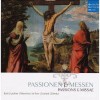
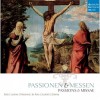
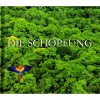
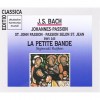
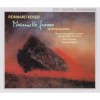
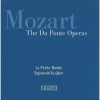
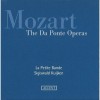
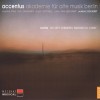
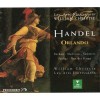
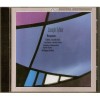
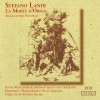
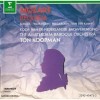
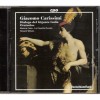
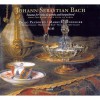
![Mozart - Complete Works [Brilliant] - Volume 9 - Don Giovanni](http://static.classicalm.com/repository/composition-cover/small/18539-img1390745184834581.jpg)